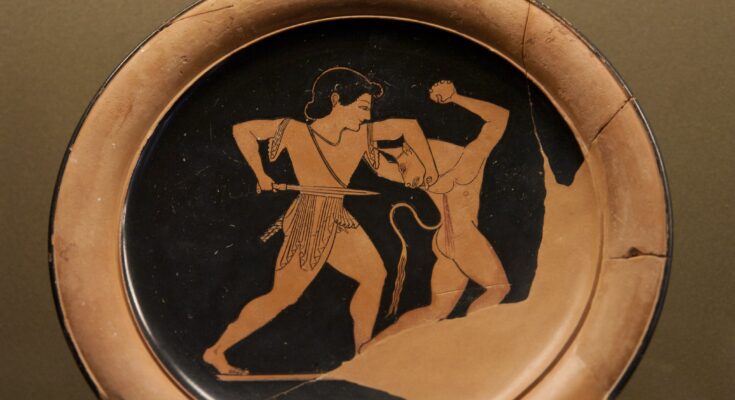The fall of the Minoans occurred around 1450 BC when the Mycenaean Greeks conquered Crete. This brought about a major change in the Central and Eastern Mediterranean, where the Minoans had long been the dominant trading force.
With such a major change, it would not be surprising if this was well remembered by later generations. Are there any examples of stories within Greek mythology that describe the fall of the Minoans?
Theseus and King Minos
One story from Greek mythology that some scholars believe describes the fall of the Minoans is the legend of Theseus and King Minos. According to legend, King Minos ruled from the Cretan city of Knossos. His rule extended over all of Crete as well as the Cyclades.
The Cretans had imposed a harsh tribute on Athens. King Minos required the king of Athens to send him seven young boys and seven young girls every nine years. The Cretans took them captive and trapped them in the Labyrinth of Knossos. There, the Minotaur would kill them.
Theseus was a prince of Athens who managed to kill the Minotaur and then escape the labyrinth. Thus, he ended Minos’ terrible treatment of the Athenians.
According to some researchers, this legend from Greek mythology may come from the fall of the Minoans. After all, it describes the fall of some kind of Cretan power at the hands of a Greek prince.
Is this legend in Greek mythology really about the fall of the Minoans?
However, there are various problems with this theory. The main problem is the issue of when this legend is actually set. When we look more closely at the details of this story from Greek mythology, it is evident that this must be set long after the fall of the Minoans.
For one thing, King Minos is clearly presented as a Greek king of Crete. In contrast, the Minoans, or native inhabitants of Crete, appear in Greek records as ‘Eteocretans.’ The legends of King Minos definitely do not present him as an Eteocretan.
Furthermore, Theseus was the father of the king of Athens who reigned at the time of the Trojan War. The date of the Trojan War is controversial. The most common date is approximately 1200 BC, but some scholars place it centuries later.
In any case, the date of the Trojan War was long after the Mycenaean conquest of Crete. Therefore, the story in Greek mythology of Theseus and King Minos cannot reasonably come from memories of the fall of the Minoans.
Atlantis and the fall of the Minoans
A more plausible suggestion is that the fall of the Minoans was remembered in Greek mythology in the legend of Atlantis. This legend was recorded by Plato in the fourth century BC.
Plato presents Atlantis as a powerful trading empire which ruled over one main island, several others, and parts of the surrounding continent. This is an accurate description of the Minoan civilization.
Various other details in the account suggest it is simply a distorted memory of the Minoans. For instance, the account of the metropolis is a remarkable match for the Minoan settlement of Thera, or Santorini. The Temple of Poseidon fits the Palace of Knossos on Crete remarkably well. Lastly, the great plain of Atlantis can be identified on Crete as well.
Of all the theories of Atlantis with a historical origin, this is the one with the greatest scholarly support by far. But how does this relate to the fall of the Minoans?
The war between Atlantis and the Greeks
In Plato’s account of Atlantis, he describes the fact that the Atlanteans and Greeks went to war against each other. Atlantis is presented as the initial aggressor. Supposedly, it managed to subdue all the other nations in the Mediterranean that opposed it.
Finally, when it seemed as if all was lost, the Greeks (led by the Athenians according to Plato’s account) managed to defeat the Atlanteans. Plato does not specifically say that the Greeks conquered the island of Atlantis, but we can logically assume that they must have done so.
Otherwise, if they had simply repelled an attack against Greece, this would not explain how the Greeks managed to free the other Mediterranean nations from Atlantis, which is something Plato mentions.
This account can very easily be understood as a distorted and exaggerated version of what really played out between the Minoans and Mycenaeans. Although we do not know who the aggressor actually was, the Greeks would obviously say it was their enemy. Similarly, the Archaic Greeks presented normal Etruscan traders as aggressive pirates.
Furthermore, Plato specifically sets this account before the collapse of Greek society. The collapse resulted in the Greeks losing their original literacy, according to Plato. This matches up with the era in which the Mycenaeans conquered Minoan Crete.
Therefore, within Greek mythology, the tale of Atlantis is one story which does describe the fall of the Minoans. On the other hand, the legend of Theseus and King Minos does not.



